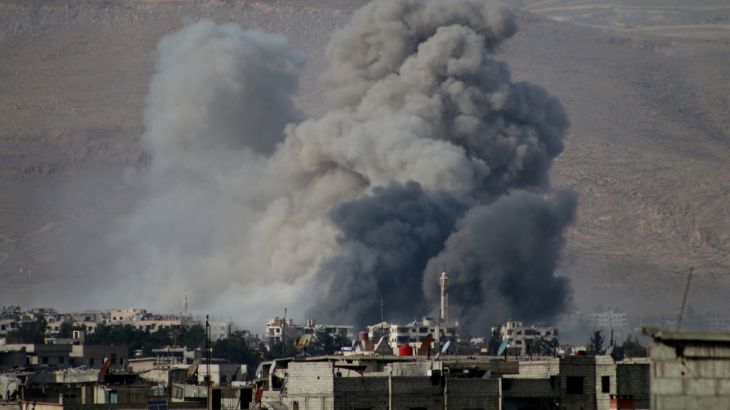UN: War crimes likely committed in Syria’s Eastern Ghouta
UN Human Rights chief Zeid Ra’ad al-Hussein says perpetrators of ‘these crimes’ will be held to account.

The UN’s human rights chief has warned that attacks on Syria’s Eastern Ghouta probably amount to “war crimes” and that those behind the targeting of civilians will be held to account.
“I must emphasise that what we are seeing, in Eastern Ghouta and elsewhere in Syria, are likely war crimes, and potentially, crimes against humanity,” Zeid Ra’ad al-Hussein said at an emergency meeting of the UN Human Rights Council on Friday.
“The perpetrators of these crimes must know they are being identified; that dossiers are being built up with a view to their prosecution; and that they will be held accountable for what they have done,” he added.
His comments come as some 400,000 civilians trapped in the besieged rebel-held suburb of Damascus are subject to a campaign of bombardment by Syrian government and Russian warplanes, which has killed at least 674 people and wounded hundreds more just two weeks, according to the White Helmets volunteer group.
Hussein said civilians were being “pounded into submission or death” in the Syrian government offensive and that aid was being prevented from entering the area.
![Smoke rises from the besieged Eastern Ghouta in Damascus [Bassam Khabieh/Reuters]](/wp-content/uploads/2018/02/0f5d95cc6dad49319ccf005e91f4f4d7_18.jpeg)
The UN official pointed to the prosecution of Serbian and Argentinian war criminals, as examples of justice being meted out to perpetrators of crimes against civilians.
“The wheels of justice may be slow, but they do grind,” he said.
Syria’s campaign in Eastern Ghouta has drawn international condemnation and an emergency UN ceasefire quickly failed to reign in its offensive on the Damascus suburb.
The Syrian government has faced accusations of indiscriminate bombing of civilians, targeting of medical facilities and emergency workers, and the use of toxic chemical agents.
In late February, Russia said it would implement a five-hour daily ceasefire to allow civilians to leave the area through a humanitarian corridor, but residents say the plan has not materialised.
|
|
The ongoing siege of Eastern Ghouta has resulted in a shortage of food and vital medicine, and according to the UN, nearly 12 percent of the area’s children suffer from acute malnutrition.
Syria’s President Bashar Al-Assad has enjoyed an upturn in fortunes since Russian military intervention started in September 2015.
Since then forces loyal to the Syrian leader have been able to claw back territory from Syrian rebels, as well as the Islamic State of Iraq and the Levant (ISIL) group, which is fighting both sides.
According to the British-based Syrian Observatory for Human Rights (SOHR), government forces are trying to advance in Eastern Ghouta.
“Regime forces and their allies have intensified their attacks on rebel positions in the past 48 hours,” Rami Abdel Rahman, SOHR head, said.
The Russia-backed government troops are trying to cut off the main town of Douma and its surroundings in the north of the enclave, as well as isolate the southeastern area of Al-Marj.
The area under rebel control is only a third of what it was at its height in 2012.
The war in Syria started in 2011 when initially peaceful protests were violently put down by the Syrian government.
The conflict has cost more than 500,000 lives, according to groups tallying the casualties.
|
|